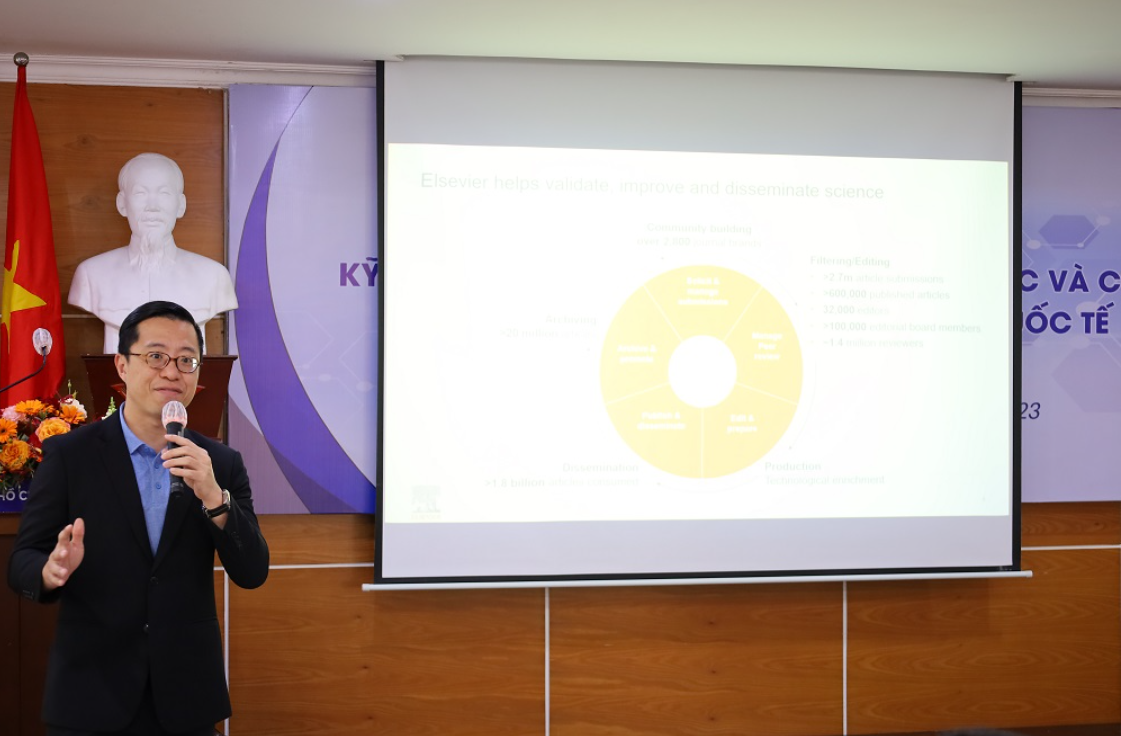Expert advisor from Elsevier shares tips for publishing international scientific papers
Date:
- 27/
- 4/
- 2023
Location:
- Vietnam National University Ho Chi Minh City (VNUHCM)
Using appropriate tenses and concise sentences, writing summary and title last, focusing on the future applicability of research data, are the secrets that Mr. Nicholas Pak – Elsevier advisor, shared with scientists, researchers, and graduate students of the VNUHCM.

Mr. Nicholas Pak – Expert advisor from Elsevier, shares tips to successfully publishing international scientific papers.
Below are the sharings of Mr. Nicholas Pak at the seminar “Skills in Data Mining and Writing International Scientific Articles” hosted by Vietnam National University Ho Chi Minh City at the VNUHCM Administrative Building on April 27.
Mr. Pak emphasized the importance of using appropriate tenses for different sections of a scientific paper to ensure academic writing meets standards.
He advised using past tense for the abstract/summary, research methods and results achieved by the authors. Meanwhile, present tense is more suitable for introducing the paper. For the discussion part around scientific research, both past and present tense can be used for expression.
Addressing the issue of article length, Mr. Pak noted that high-impact journals prefer concise writing. Some studies have shown that Americans or British people may find it difficult to understand English sentences longer than 20 words.
He recommended “It’s best to aim for an average sentence length of 12-17 words and avoid using multiple tenses in a single sentence”.
Regarding the methodology for writing a scientific paper, Mr. Pak suggested a reverse approach. Instead of starting with the title, abstract, keywords, then going into details, he said that the researchers should begin from the bottom up.
“First, we need to gather data and choose the appropriate methodologies to write the paper. Then, identify the results and discuss them. The introduction section will summarize the discussions of those results. Finally, we can make a title, summarize and add keywords for the paper. The most important part is the abstract. It must synthesize all the issues, methods, and provide the results of the research. Because editors need to grasp the core information of the paper through the abstract, so it should be written after completing the paper.” – He explained.
Mr. Nicholas Pak also advised researchers to avoid using their previous self-citation in their papers. Using too many citations from their own research can make their new scientific paper unproductive and less innovative.
“If we want our paper to be easily and quickly accepted for publication, we need to research how our data will be developed and applied in the next 2-3 years. Then, editors will be more likely to accept our paper”. – He noted.
Furthermore, Mr. Pak highlighted the challenge of selecting suitable journals for scientific papers’ publication. He suggested to researchers that at first, they need to understand the aims of their target journals and the interests of their editors when it comes to scientific ideas.
“Our draft may not be wrong, but the scientific ideas, approaches, and beliefs of the editor-in-chief or editors of that journal may not align with our paper, so our article may not be accepted,” – Mr. Nicholas Pak shared.
By: PHIEN AN
